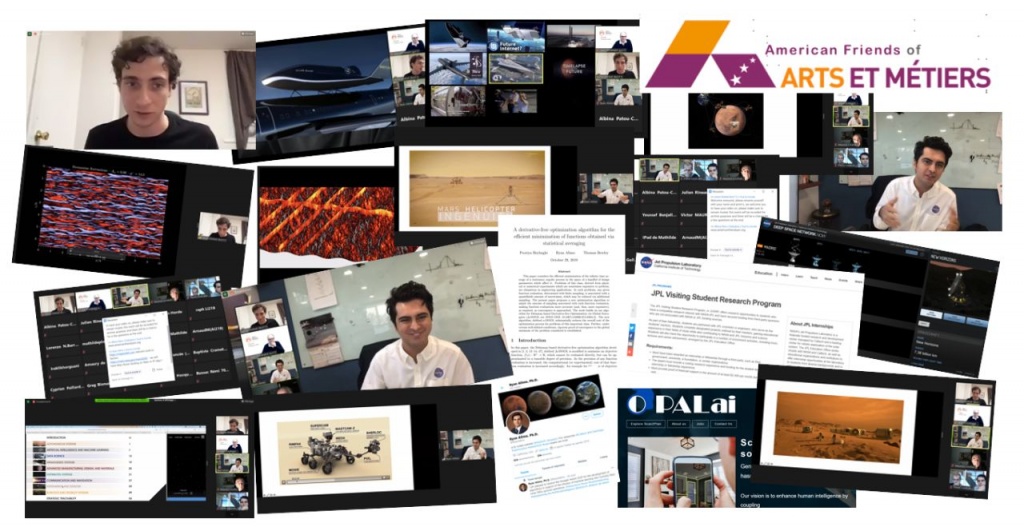On November 13th the first online event entitled "Gadz Stories #1" took place. The event was dedicated to aerospace and the role of Data Science and AI in this field.
We would like to thank our speakers - Dr. Ryan Alimo and Sacha Ghebali (Bo 211) - for sharing their experience working in this promising sector.
More about the speakers:
- Dr. Sacha Ghebali (Bo 211)
Sacha studied at Arts et Metiers in Bordeaux, then completed the Research Master in Fluid Mechanics in Paris and went on to pursue a PhD in Aeronautics at Imperial College London with a studentship from Airbus and Innovate UK. His research focused on turbulence and optimizing wall geometries to reduce the turbulent drag.
Sacha carried out research for Safran on propeller performance for contra-rotating propellers (CROR) and for Swiss Space Systems at the von Karman Institute for Fluid Dynamics where he undertook experimental studies on the interaction between the carrier aircraft and the space shuttle in low-speed conditions.
Sacha collaborated with Dr. Alimo during his PhD at UCSD on using non-convex derivative-free optimization methods in order to maximize the turbulent drag reduction obtained by a passive alteration of a flat surface via interaction with the near-wall turbulent activity. We will get a chance to touch on this during the event.
After completing his PhD, Sacha went on to work as an early employee at Monolith AI, a company working on building AI assistants for complex design problems. He then completed a business degree at MIT and is now working in crypto currencies at an early stage company.
- Dr. Ryan Alimo
Ryan Alimo is a lead data scientist at NASA's Jet Propulsion Laboratory (JPL), California Institute of Technology's deep learning group. His primary research interests span theory and practice of nonconvex optimization for machine learning for autonomous spacecraft systems, and he is advancing the field of human-AI teaming and multi-agent systems. In particular, he has been working on developing and analyzing deep learning algorithms for teams of robots and humans, which can cooperate to form virtual structures and networks and perform distributed measurements and computation that is usually not possible with a single robot or a human operator. His work enables new capabilities in deep space explorations for NASA in the areas of spacecraft formation flying, automation of deep space communication (DSN) network, and automation of the Curiosity Mars rover's ground data system.
Prior to NASA's JPL, Dr. Alimo worked as a Postdoctoral Fellow at the Caltech’s Center for Autonomous Systems and Technology (CAST), working on the autonomy of flying cars and spacecraft formation flying. He received the Ph.D. degree in Computational Science from the University of California, San Diego (UCSD), and the B.Sc. degree in Computational Mechanics from Sharif University of Technology (STU). Dr. Alimo was awarded the NASA's JPL Voyager Award in 2019 & 2020 for his work in integrating novel optimization algorithms with deep learning models to develop autonomous spacecraft, was a nominee for Forbes 30 under 30 2020 in science, awarded UCSD's outstanding graduate student award in 2017, and awarded gold medalist of the 2005 national astronomy Olympiad.
In addition to his machine learning research at NASA, Dr. Alimo is getting his MBA degree from the University of California, Los Angeles. He also founded a technology startup company, OPAL AI INC, that develops augmented intelligence (AI) software to automate labor-intensive tasks leveraging commercially-off-the-shelf (COTS) hardware.
We are looking forward to the news events "Gadz Stories" organized by AFAM!
Useful links:
To sign up for AFAM monthly newsletter: here
Turbulent drag reduction by oblique wavy wall undulations (By Sacha Ghebali): https://spiral.imperial.ac.uk/handle/10044/1/63827
https://mars.nasa.gov/mars2020/- we will have Mars Rover landing on Mars in less than 100 days!
Deep Space Network - https://eyes.nasa.gov/dsn/dsn.html
A derivative-free optimization algorithm for the efficient minimization of functions obtained via statistical averaging (by Ryan Alimo and others): https://arxiv.org/pdf/1910.12393.pdf
Tuning a variational autoencoder for data accountability problem in the Mars Science Laboratory ground data system (by Ryan Alimo and others): https://arxiv.org/pdf/2006.03962.pdf
https://scienceandtechnology.jpl.nasa.gov/research/strategic-technologies
Computer vision application: https://arxiv.org/pdf/2001.10673
For new research works follow Dr. Alimo at: https://twitter.com/RyanAlimo


 BLOG /
BLOG /  CALENDAR /
CALENDAR /  DONATIONS /
DONATIONS /  MENTORS /
MENTORS /